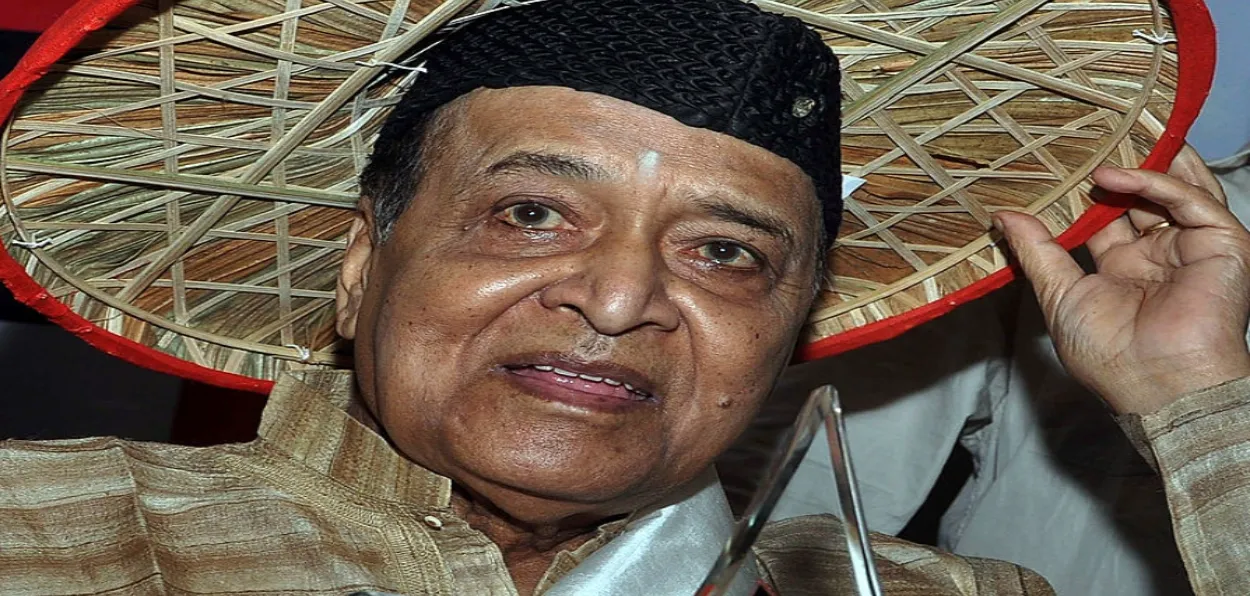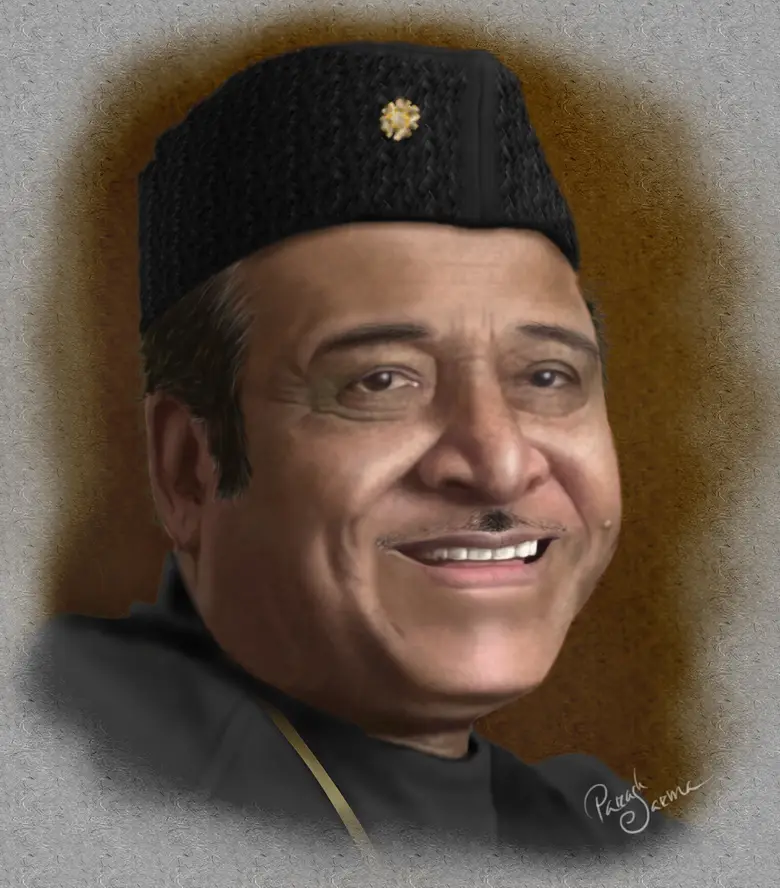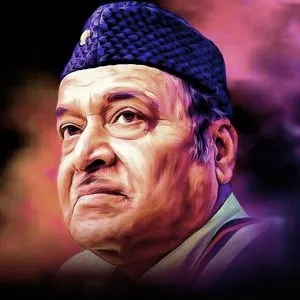
Ananya Gogoi
"If I say I love my mother, Do I need to show disgust for others' mothers? Every Assamese person is a good Indian."
-Dr. Bhupen Hazarika
Through his remarkable infusion of global dimensions into Assamese music, Bharat Ratna Dr. Bhupen Hazarika has sown the seeds for a transformative future within the Assamese community. Skilfully blending traditional Assamese folk tunes with contemporary rhythms, his creative ethos was rooted in the aspiration to unify humanity through a cultural renaissance, a movement designed to cultivate a profound and interconnected human culture.
Bhupen Hazarika (1926-2011)
He envisioned humanity as an intricate web of relationships, transcending geographical boundaries and cultural barriers. The vibrant artistic expressions he crafted within the realm of human consciousness, harnessing the boundless capabilities of language and literature, are truly unparalleled. His profound reverence for Assam permeated his works, weaving cultural heritage and national identity in a manner that resonates powerfully within the fertile landscape of his beloved homeland.
Dr. Hazarika espoused a conviction that the culture of humanity is fundamentally one of unity. This steadfast commitment manifested in the timeless songs he composed, which continue to echo through the corridors of history. His desire to awaken the Assamese identity not only illuminated his heart but also established a crucial connection between the rich historical legacy of the past and the contemporary consciousness of today, imbuing the Assamese people with renewed self-assurance.
For the Assamese to thrive in their homeland, a profound yearning for their language and culture is essential. In this noble pursuit, Dr. Hazarika aimed not just to preserve traditional forms but also to reinvigorate them, ensuring that they resonate with contemporary audiences while respecting their roots.
He characterized himself as an ardent lover of global harmony, underscoring the poignant truth that a community unable to nurture its cultural heritage renders the notion of universal love hollow and insincere. He envisioned the Assamese identity shining brilliantly on the world stage, asserting that if the Assamese existed merely as disabled appendages in the grand corporeal construct of humanity, they risked obscurity.
 Dr. Bhupen Hazarika
Dr. Bhupen Hazarika
He recognized that without skill, creativity, and brilliance, the Assamese would struggle to claim their rightful place in the competitive global sphere. This aspiration demanded a steadfast commitment to exalt one’s motherland within the global arena, emphasizing the necessity of integrating both indigenous voices and newer members of the Assamese community to nurture national vitality.
Aspiring to construct bridges of harmony through the rich invocation of culture and heritage, Dr. Hazarika understood that division is a self-destructive phenomenon. He firmly believed that labour serves as the backbone of national strength, urging the Assamese populace to engage wholeheartedly in diligent efforts. Without this commitment, he argued, the revival of Assamese identity would remain an elusive dream, slipping away like sand through fingers.
The Brahmaputra River embodied not only his dreams but also his very essence, serving as a source of courage, inspiration, and resilience along the arduous path toward nationhood. He affectionately referred to it as the "Maha Bahu Brahmaputra," a sacred pilgrimage carrying the age-old message of unity. As a historian, his engagement with history profoundly influenced his artistic vision. His relentless pursuit to define its essence, combined with a research-informed perspective, imbued his works with significant depth, establishing them as perennial sources of inspiration.
The revered sage Mahapurush Srimanta Sankardeva, born into the Barbhuyan lineage from Kanyakubja, played a pivotal role in reshaping the self-identity of the Assamese community. His enduring legacy resonates through the harmonious melodies that enliven Assamese music, ranging from the soulful expressions of Ajan Fakir's jikirs to the artistic representations found within the Hastividyarnava, crafted by Dilbar and Dosa.
Historical figures such as Teg Bahadur of Panchanadi built bridges rooted in righteousness- an aspiration that echoes Dr. Hazarika’s longing for a legacy of unity to catalyse national awakening. The valorous deeds of Lachit Borphukan resonate throughout Dr. Hazarika's compositions, and he often invoked the verses of Rabindranath Tagore to promote a deep sense of brotherhood among all people.
 A Painting of Dr. Bhupen Hazrika
A Painting of Dr. Bhupen Hazrika
In his poignant song “Mahatmai Hasi Bole..,” Dr. Hazarika delved into the essence of human culture, illuminating the sustaining spirit of unity that it embodies. Through the symbolic invocation of Mahatma Gandhi, he painted a vision of coherence and harmony, declaring- If the Mahatma smiles, I shall listen to the Vedas; I shall engage with the Quran, ever aspiring to understand the prayers of both Rama and Rahim!
This lyrical expression resonates with a profound message: violence has no legitimate place within the fabric of society. Rather, religion should serve as a conduit encouraging humanity to seek artistic beauty and sensibility, eschewing bloodshed altogether.
ALSO READ: Sanskrit scholar Onampilly Faizy runs Islamic academy where Vedanta and Quran are taught
Bhupen Hazarika’s music encapsulates ideals of humanism, fraternity, and unity- ideals that must inspire the community toward perpetual advancement. His melodies carry within them the promise of a united future; each song acts as a clarion call to action, urging his audience to cherish and embrace their heritage while simultaneously looking toward the horizon of global interconnectedness. The values embedded in the multifaceted songs of this illustrious artist- a true maestro of harmony- should guide us in the noble quest to cultivate an enlightened and cohesive humanity.
The writer is a Senior Information Officer with Assam Government
